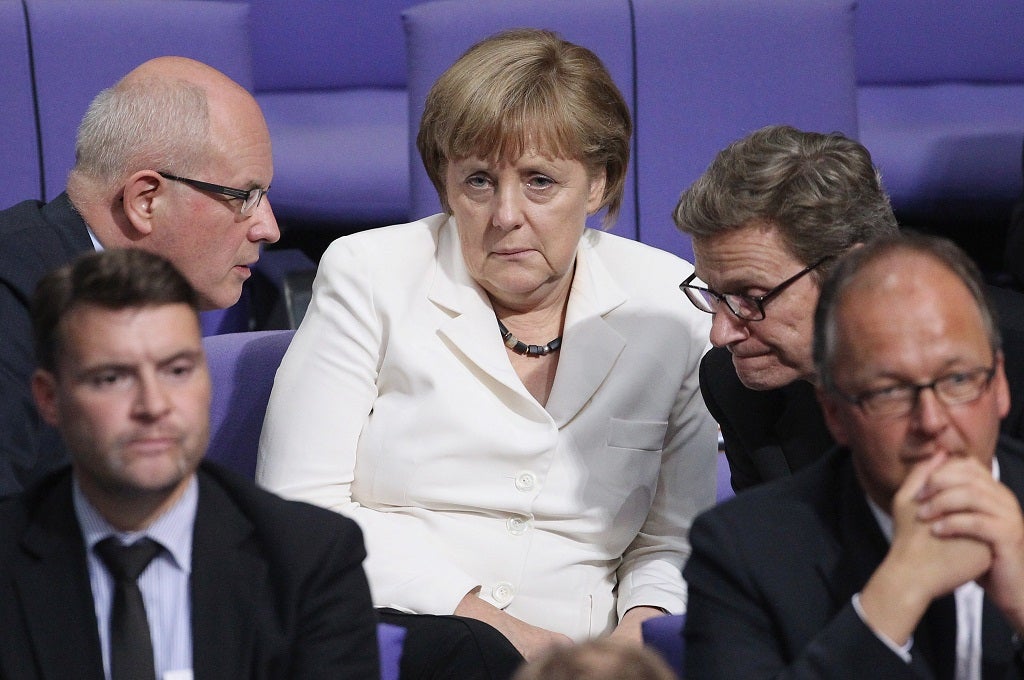Everyone has it in for the Germans at this EU summit. But their stalling this time has a point
By dragging her feet on a proposed banking union, Angela Merkel may be holding up a solution to the Eurozone crisis. Is she right to do so?

Pity the poor German Chancellor, Angela Merkel. They all had it in for her as the EU Summit started yesterday. Mario Monti of Italy, Mariano Rajoy of Spain and, most publicly of all, the new President of France, François Hollande, were of one voice in condemning Germany for holding up a solution to the eurozone crisis.
They have a point. Germany has been dragging its feet, particularly over banking union. Nor has its Finance Minister, Wolfgang Schäuble, helped by coming up with a grand plan to establish a new eurozone commissioner charged with enforcing budgetary discipline. It would involve, as he well knows, treaty changes triggering referendums in France, Ireland and Britain, with all the chaos which that would bring about.
Nonetheless, it’s a bit rich, and very French, of President Hollande to accuse Mrs Merkel of being over-obsessed with her domestic public opinion when she should be putting aside such considerations in the interests of European solidarity.
When has France ever done that, she might well retort. Its present concern to see common eurozone bonds and a monthly meeting of eurozone presidents has little to do with the common European good and rather more with France’s own economic constraints and its opposition to moves that might move power from Paris to Brussels.
If they are to get anywhere with Germany, its partners need to understand its point of view. Far from being mule-like in her nationalism, Ms Merkel has actually been ahead of her own party and personal interests in pursuing support for the euro.
It’s too easily forgotten that Germany only gave up the deutschmark with extreme reluctance and that its government was only able to sell the euro to the public on the basis that the European Central Bank would preserve its sanctity by refusing to print money to bail out spendthrift members.
That, to many Germans, including the head of the Bundesbank, is exactly what France and others are asking for it to do now. And its objections have validity. Hollande may say that Germany is not the only country contributing to the bailout funds. That is true. But it is also true that any issuance of common euro bonds will rest on Germany’s guarantees and hence liability.
German quibbling over the decision in June to allow the rescue fund to bail out banks directly without involving sovereign liability has a point. It could easily become a means for governments to remove the responsibility for their banks and liabilities from their balance sheets.
The latest summit is not going to solve all these problems at a stroke, not least because the crisis isn’t so bad at the moment as to force a quick resolution. A Greek exit now seems less likely in view of the agreement on the next tranche of loans. The borrowing costs of Spain and Italy have fallen back, partly on the assumption that Spain will seek a bailout soon after the summit. The Dutch elections have gone the way of the pro-Europeans. The German Constitutional Court has approved the expansion of the bailout funds. Thanks partly to Ms Merkel, Spain and Portugal have been given a year more to repay debts and Greece is likely to get another two.
Hollande, Monti and Rajoy are right on one thing, however. It’s no good talking of political union and full economic integration at this point. What is needed is a plan for the immediate future, including positive moves towards a banking union. And they are needed by December’s end-of-year meeting if the progress made so far is not going to slip away.
My guess is that Angela Merkel will play ball in the end. But hectoring is not the right way to go about persuading her or her voters.
Join our commenting forum
Join thought-provoking conversations, follow other Independent readers and see their replies
Comments
Bookmark popover
Removed from bookmarks